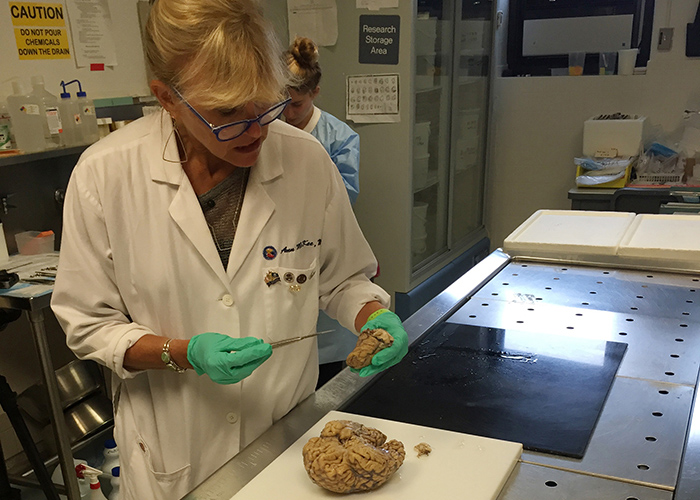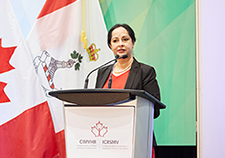Office of Research & Development |
 |


A study carried out with the help of VA’s National PTSD Brain Bank has yielded new insights on changes that occur in the brain of those affected by PTSD. (Photo courtesy of VA Boston Healthcare System)
January 6, 2021
By Peggy Willoughby
VA National Center for PTSD
"We have advanced our understanding of the cellular and molecular alterations in PTSD brains, and this brings us closer to designing more effective treatment strategies."
The most rigorous study to date examining post-mortem brain tissue from those with PTSD has identified molecular changes in the brain that may lead to new ways to diagnose and treat the disorder.
The study appeared online in the journal Nature Neuroscience on Dec. 21, 2020. Researchers with the VA National Center for PTSD, VA’s National PTSD Brain Bank, and Yale University School of Medicine carried out the study.

VA Researcher Named One of U.S.’ Top Female Scientists

Million Veteran Program director speaks at international forum
“This is a historic step in PTSD research that will mean better treatment for Veterans with PTSD,” says study coauthor Dr. John Krystal, director of NCPTSD’s Clinical Neuroscience Division and chair of psychiatry at Yale University. “We have advanced our understanding of the cellular and molecular alterations in PTSD brains, and this brings us closer to designing more effective treatment strategies.”
PTSD develops in some people who have experienced or witnessed a life-threatening event, and includes intrusion, avoidance and hyperarousal symptoms as well as negative thoughts and mood. Besides psychotherapy, current treatments include medications that researchers say are helpful in minimizing—but not eliminating—PTSD symptoms.
The study, led by Dr. Matthew Girgenti of VA and Yale, is the first to pinpoint genetic changes related to PTSD that are specific to gender, and to certain brain subregions.
Understanding how PTSD differs within the brains of men and women is important, because women are more likely to develop PTSD after experiencing trauma. Also, there may be differences in how men and women respond to treatment. The finding underscores the need to develop different treatment strategies for men and women.
The study also showed major differences in how PTSD and depression look in the brain. Some symptoms overlap between the two conditions, and researchers say that about half of those diagnosed with PTSD are also diagnosed with depression. The finding could potentially help clinicians better distinguish between the conditions and offer more effective treatment.
The findings come from the first major research study using brain tissue from the National PTSD Brain Bank. The bank is led by study co-author Dr. Matthew Friedman of the NCPTSD and Geisel School of Medicine at Dartmouth. The program collects, processes, and stores human research specimens and provides them to qualified researchers to learn more about illness in Veterans.
VA Research Currents archives || Sign up for VA Research updates